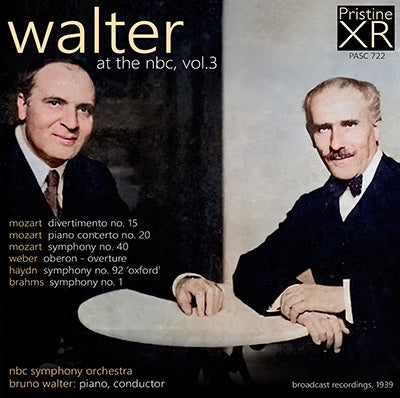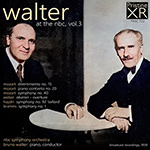
This album is included in the following sets:
This set contains the following albums:
- Producer's Note
- Full Track Listing
- Cover Art
Bruno Walter gave the first of two concerts with the NBC Symphony Orchestra last night in Radio City, and the occasion was one long to be remembered. The program was devoted to Mozart, for whose interpretation Mr. Walter has been long and justly famous.
Mr. Walter appeared as pianist as well as conductor in the performance of the D minor concerto, which he led in the old style, from his seat at the keyed instrument, guiding the orchestra from that post as he played. This performance, as indeed all the others of the evening, had a transforming effect in the presentation of the glorious music.
The B flat Divertimento (K. 287), which opened the program, is performed too seldom, for it is one of the most beautiful compositions of th classic era. Mozart wrote much music in the course of the night and the day. Not all of it was of the same quality, though there were few composers, in any age, who could be relied to give such generous measure of genius even to the creation of a pot-boiler.
A Charming Interpretation
But there are Divertimenti and Divertimenti. The Divertimento heard last night, in six short movements, scored for string orchestra and horns, is a creative miracle in every one of its parts, and it could hardly have been interpreted more charmingly.
The small orchestra was of a size commensurate with Mozart's original instrumentation. It may be said here that the smaller band sounded better, if anything, than the big symphonic aggregation when heard in Studio H-8. Or perhaps we attribute the beauty and resonance of the tone to the wrong cause: some credit, certainly, is owing to the clarity and the radiance of Mozart’s orchestration. As it was, Mr. Walter conducted with the authority, economy of gesture, and taste, of an inspired master. Every phrase was of exquisite beauty and of an expressiveness very moving, yet held within the bounds of the aristocratic eighteenth century style.
The score was calculated to display to the best advantage the virtuosity of the individual players. Had they been less than masters of their task they would have been pitilessly exposed by the transparency of the orchestration and the proportions of the hall, where the performances have here the effect of the intimacy and subtlety of detail of chamber music.
Walter’s Pet Composer
It was, in fact, a chamber orchestra that we heard, one that a nobleman of Mozart's day would have been proud beyond words to possess as the vehicle of the genius of his pet composer. This was an aggregation of players for Mr. Walter to conjure with. The opportunity found him in the happiest mood, one which released all his great interpretive qualities.
The result was one of the most distinctive concerts the NBC Symphony has given. Each solo part sang a song. Effects of the strings, in mass or when part marched against part, were of the utmost finish and spirit. The music had the winged Mozart flight. It flashed and soared, without suspicion of the weight or cumbrousness of the mortal coil. It had its own life, its own breadth, its own realm of existence.
The orchestral introduction of the concerto was impressively different from that to which a concert-goer is accustomed, and very romantic in mood. For a rarity, one interpreting mind matched the orchestral and piano parts. The effect suggested that only a conductor capable of the double task should be allowed to interpret Mozart concerti. Yesterday, at any rate, there was perfect balance, and songful style in every part, Not often has the D minor concerto been given such a presentation.
The G minor symphony was fully in the tradition, yet so vitalized, and every phrase so instinct with comprehension and feeling, that it communicated an entirely fresh impression. It would be a pleasure to particularize here, but the hour forbids it. We had not heard the Minuet treated with such breadth, or the finale played with such energy, feeling, passion. The audience was deeply impressed, and was long in allowing Mr. Walter to leave the stage.
Olin Downes, The New York Times, 12 March 1939
BRUNO WALTER at the NBC, Volume 3
disc one (78:44)
1. RADIO Introduction (0:52)
MOZART Divertimento No. 15 in B-flat major, K.287
2. 1st mvt. - Allegro (6:18)
3. 2nd mvt. - Theme (0:44)
4. Variation 1 (0:37)
5. Variation 3 (0:35)
6. Variation 5 (0:33)
7. Variation 6 (0:57)
8. 4th mvt. - Adagio (7:41)
9. 5th mvt. - Menuetto - Trio (4:02)
10. 6th mvt. - Andante - Allegro molto (6:52)
MOZART Piano Concerto No. 20 in D minor, K. 466
11. 1st mvt. - Allegro (12:28)
12. 2nd mvt. - Romance (7:54)
13. 3rd mvt. - Allegro assai (6:23)
MOZART Symphony No. 40 in G minor, K. 550
14. 1st mvt. - Molto allegro (5:56)
15. 2nd mvt. - Andante (8:13)
16. 3rd mvt. - Menuetto (4:07)
17. 4th mvt. - Allegro assai (4:32)
disc two (78:20)
1. RADIO Introduction (0:47)
2. WEBER Oberon - Overture (8:46)
HAYDN Symphony No. 92 in G major, "Oxford" Hob.I:92
3. 1st mvt. - Adagio - Allegro spiritoso (5:37)
4. 2nd mvt. - Adagio (8:25)
5. 3rd mvt. - Minuet - Trio (5:07)
6. 4th mvt. - Finale. Presto (6:56)
BRAHMS Symphony No. 1 in C Minor, Op. 68
7. 1st mvt. - Un poco sostenuto - Allegro (12:29)
8. 2nd mvt. - Andante sostenuto (8:37)
9. 3rd mvt. - Un poco allegretto e grazioso (4:11)
10. 4th mvt. - Adagio - Allegro non troppo, ma con brio (14:47)
11. RADIO Conclusion (2:38)
NBC Symphony Orchestra
Bruno Walter: conductor, piano
XR Remastered by Andrew Rose
Cover artwork based on a photograph of Bruno Walter with Arturo Toscanini
Disc 1: Broadcast concert of 11 March 1939
NB. Radio announcements have been edited to fit. The live performance omitted two variations and one movement of the Divertimento, together with numerous repeats.
Disc 2: Broadcast concert of 18 March 1939
Broadcast from Studio 8-H, Radio City, New York City
Total duration: 2hr 37:06

